Churches serve as pillars of strength and unity within communities, offering solace, guidance, and a nurturing environment for their members.
However, amidst the spiritual and communal responsibilities they shoulder, churches also face practical challenges in maintaining their physical infrastructure.
One of the most crucial aspects of this upkeep is ensuring effective heating, ventilation, and air conditioning (HVAC) systems.
Yet, the financial constraints that many churches encounter can make the installation or upgrading of HVAC systems a daunting prospect.
To address this pressing need, numerous organizations extend a helping hand through dedicated HVAC grants tailored specifically to churches.
These grants are designed to provide financial assistance to religious institutions, enabling them to enhance the comfort, safety, and sustainability of their facilities.
By supporting HVAC improvements, these grants not only contribute to the well-being of congregants but also bolster the church’s ability to fulfill its mission within the community.
In this comprehensive guide, we delve into the intricate application process for churches seeking to secure HVAC grants.
From elucidating the eligibility criteria to detailing the requisite documents and steps involved, we aim to empower churches with the knowledge and resources needed to navigate this vital funding avenue successfully.
Whether you’re embarking on a journey to upgrade your church’s HVAC infrastructure or exploring opportunities to bolster its long-term sustainability, this guide serves as a roadmap towards achieving your goals effectively.
How to Get HVAC Grants For Churches: A Comprehensive Guide to Securing Funding
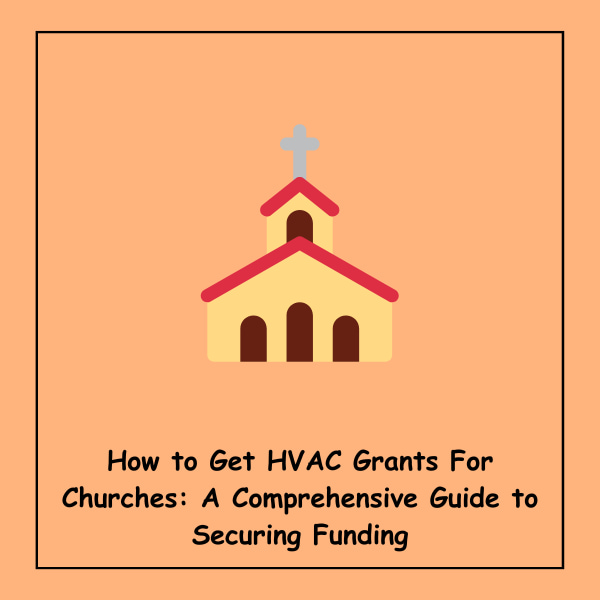
Churches serve as vital community hubs, offering spiritual guidance, support and a place of gathering for congregants.
However, maintaining the physical infrastructure of a church, including heating, ventilation, and air conditioning (HVAC) systems, can be financially challenging.
Thankfully, there are avenues for churches to receive financial assistance through HVAC grants specifically tailored to support their infrastructure needs.
Below is an in-depth exploration of the application process for securing HVAC grants for churches, along with additional details to ensure a successful funding outcome.
1. Research Grant Opportunities:
Begin your journey by conducting thorough research to identify organizations that offer HVAC grants catered to churches.
This process may involve exploring various avenues such as online databases, community bulletin boards, government agency websites, and networking within religious circles. Take note of grant providers that align with your church’s mission and focus areas.
2. Understand Eligibility Criteria:
Each grant provider may have unique eligibility criteria that churches must meet to qualify for funding.
Common requirements include official non-profit status, demonstrated need for HVAC upgrades or installations, adherence to local building codes and regulations, and evidence of significant community impact.
Carefully review the eligibility criteria of each grant opportunity to ensure alignment with your church’s circumstances.
3. Gather Necessary Documents:
Prepare a comprehensive set of documents required for the grant application process. This may include:
- Proof of Non-profit Status: Obtain official documentation from relevant authorities, such as the Internal Revenue Service (IRS), confirming your church’s non-profit status.
- Estimates or Quotes: Solicit estimates or quotes from reputable HVAC contractors outlining the scope of work, associated costs, and anticipated timelines for the proposed HVAC improvements.
- Financial Statements: Compile financial statements demonstrating your church’s financial stability and capacity to manage grant funds responsibly.
- Building Assessments: Conduct assessments of your church’s current HVAC systems, documenting any deficiencies, maintenance history, and recommended upgrades or repairs.
- Mission Statements or Community Impact Reports: Articulate your church’s mission, values, and the tangible impact it has on the local community through outreach programs, social services, or other initiatives.
4. Complete the Application Form:
Once you have gathered the requisite documents, proceed to complete the grant application form provided by the grant provider.
Pay close attention to all instructions and ensure that the information provided is accurate, comprehensive, and aligns with the grant’s objectives.
Clearly articulate the specific HVAC improvements or upgrades required and how they will contribute to the overall mission and sustainability of your church.
5. Submit the Application:
Submit the completed application along with the supporting documents within the specified deadline.
Ensure that all materials are organized, legible, and submitted through the designated channels as outlined by the grant provider. Keep records of your submission for future reference and follow-up.
6. Follow Up and Provide Additional Information:
After submitting the application, maintain open lines of communication with the grant provider.
Be prepared to respond promptly to any requests for additional information or clarification regarding your application.
Proactively address any concerns raised by the grant provider and provide supplementary documentation or explanations as needed to strengthen your case.
7. Monitor Application Status and Engage in Dialogue:
Stay actively engaged in the application process by monitoring the status of your submission.
Keep track of any updates, notifications, or communications from the grant provider regarding the review and decision-making process.
Maintain a professional and responsive demeanor, demonstrating your church’s commitment and readiness to collaborate with the grant provider.
8. Celebrate Success or Seek Feedback:
If your application is successful and your church receives the HVAC grant, celebrate this achievement as a testament to your collective efforts and commitment to enhancing your facilities.
Express gratitude to the grant provider and ensure transparent communication regarding the utilization of the funds.
Alternatively, if your application is not successful, graciously accept the outcome and consider seeking feedback from the grant provider to understand areas for improvement.
Use this feedback constructively to refine future applications and explore alternative funding opportunities.
By meticulously following these steps and providing comprehensive documentation, churches can navigate the application process for HVAC grants with confidence and increase their chances of securing vital funding for infrastructure improvements.
Eligibility Criteria to Get HVAC Grants For Churches Application Process
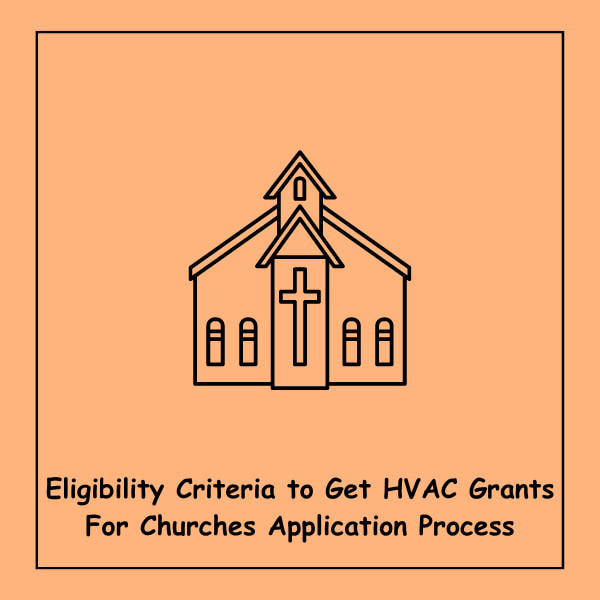
- Non-profit Status: Grant providers typically require churches to demonstrate their status as registered non-profit organizations. This entails presenting official documentation, such as IRS determination letters or certificates of incorporation, validating the church’s non-profit status.
- Demonstrated Need: Churches must articulate a genuine need for HVAC upgrades or installations to qualify for grants. This necessitates providing detailed evidence, which may include maintenance records, energy audits, or assessments highlighting the inefficiency or inadequacy of existing HVAC systems.
- Community Impact: Grant programs often prioritize churches that have a tangible impact on their communities. This can encompass various activities, such as providing shelter for the homeless, hosting community events, or offering educational programs. Churches seeking grants should provide documentation illustrating their community involvement and the positive outcomes of their initiatives.
- Compliance: Churches must adhere to local building codes, zoning regulations, and environmental standards to be eligible for HVAC grants. Compliance ensures that the proposed HVAC improvements meet safety requirements and contribute to environmental sustainability. Churches should be prepared to demonstrate their compliance with relevant regulations through documentation and certifications.
Document Requirement for Getting HVAC Grants For Churches Application Process
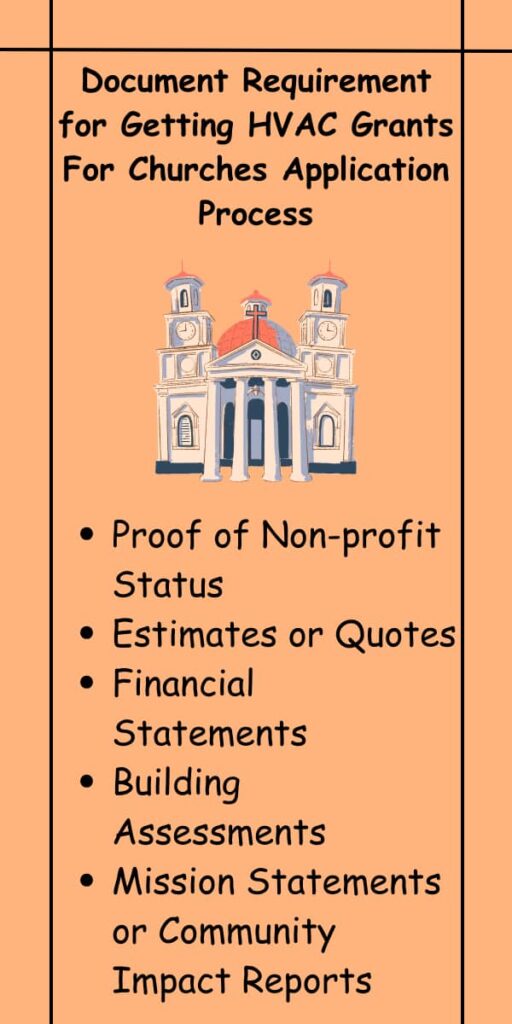
- Proof of Non-profit Status: Churches need to furnish official documents proving their non-profit status. These documents may include IRS determination letters, certificates of tax-exempt status, or articles of incorporation. Verification of non-profit status is crucial for grant providers to ensure that funds are allocated to eligible entities.
- Estimates or Quotes: Churches should obtain detailed estimates or quotes from licensed HVAC contractors outlining the scope of work, itemized costs, and proposed timelines. These estimates help grant providers assess the feasibility and cost-effectiveness of the proposed HVAC project. Churches should seek multiple quotes to ensure competitive pricing and thorough project planning.
- Financial Statements: Grant providers typically require churches to submit financial statements to assess their financial stability and capacity to manage grant funds responsibly. Financial statements, including balance sheets, income statements, and cash flow statements, offer insights into the church’s financial health and ability to sustain the proposed HVAC project.
- Building Assessments: Churches must conduct comprehensive assessments of their existing HVAC systems to identify deficiencies, assess performance, and determine the scope of necessary improvements. These assessments may include energy audits, HVAC system evaluations, and building condition assessments. Churches should provide detailed reports outlining the findings and recommendations for HVAC upgrades or replacements.
- Mission Statements or Community Impact Reports: Some grant programs require churches to submit mission statements or reports detailing their mission, values, and community impact. These documents help grant providers evaluate the church’s alignment with funding priorities and assess the broader societal benefits of supporting HVAC improvements. Churches should highlight their community engagement initiatives, outreach programs, and social services in these reports.
Application Process for Getting HVAC Grants For Churches Application Process
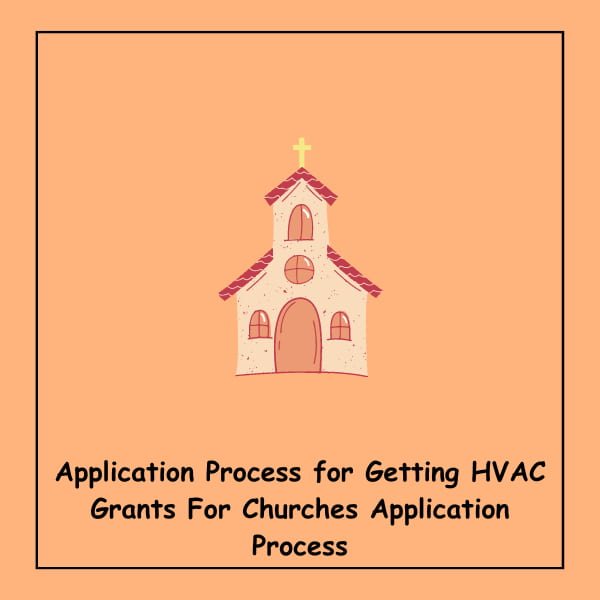
- Research Grant Opportunities: Churches should conduct thorough research to identify grant opportunities that align with their needs and objectives. This involves exploring various sources, such as government agencies, foundations, and non-profit organizations, to identify potential funding sources for HVAC projects.
- Review Eligibility Criteria: Before applying for grants, churches should carefully review the eligibility criteria set by each grant program. This includes understanding specific requirements related to non-profit status, project scope, geographical focus, and community impact. Churches should ensure that they meet all eligibility criteria before proceeding with the application process.
- Gather Required Documents: Churches must compile all necessary documents required for the grant application. This may include proof of non-profit status, estimates or quotes from HVAC contractors, financial statements, building assessments, mission statements, and community impact reports. Churches should organize these documents systematically to streamline the application process.
- Complete the Application Form: Churches should fill out the grant application form accurately and thoroughly, providing all requested information and supporting documentation. It is essential to adhere to any formatting guidelines and submission instructions specified by the grant provider to ensure that the application is processed smoothly.
- Submit the Application: Once the application is complete, churches should submit it along with the required documents within the specified deadline. It is advisable to confirm receipt of the application with the grant provider and retain proof of submission for future reference.
- Follow-Up: After submitting the application, churches should follow up with the grant provider to confirm receipt and inquire about the status of their application. Churches should be prepared to provide additional information or clarification if requested by the grant provider.
- Monitor Application Status: Churches should actively monitor the status of their application and stay informed about the progress of the review process. It is essential to respond promptly to any communication from the grant provider and address any queries or concerns raised during the review process.
- Celebrate Success or Seek Feedback: If the application is successful and the church receives the HVAC grant, it is essential to celebrate this achievement and express gratitude to the grant provider. If the application is not successful, churches should seek feedback from the grant provider to identify areas for improvement and consider reapplying in the future or exploring alternative funding opportunities.
Types of HVAC Grants Offered to Churches
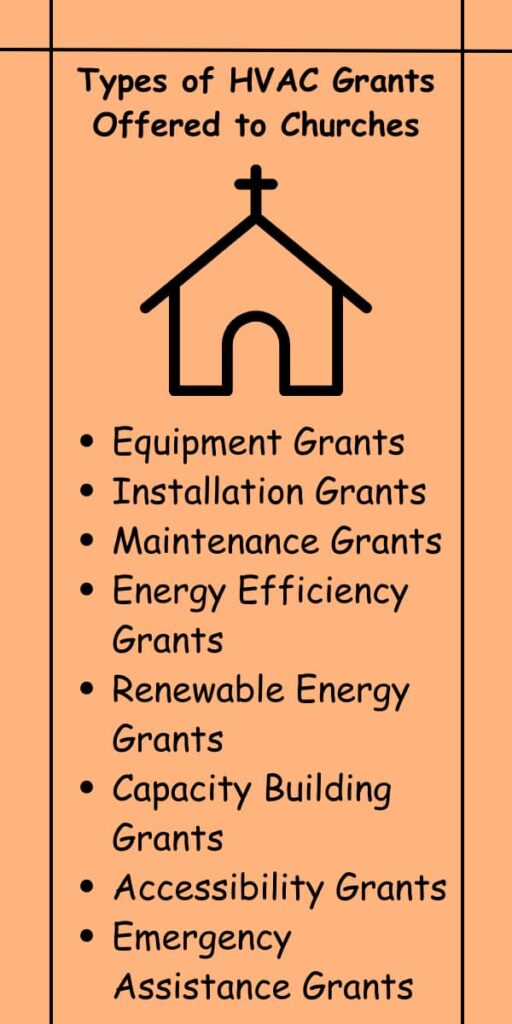
- Equipment Grants: These grants cover the cost of purchasing HVAC equipment such as furnaces, air conditioners, heat pumps, boilers, or ventilation systems. Equipment grants enable churches to acquire essential HVAC components necessary for efficient heating, cooling, and ventilation within their facilities.
- Installation Grants: Installation grants provide funding for the labor and installation services required to implement HVAC upgrades or installations. This includes expenses associated with hiring HVAC contractors, technicians, and other professionals to complete the installation process according to industry standards and regulatory requirements.
- Maintenance Grants: Maintenance grants support ongoing maintenance and repair activities for existing HVAC systems within churches. These grants may cover costs associated with routine inspections, servicing, repairs, or replacement of HVAC components to ensure optimal performance, energy efficiency, and longevity of the systems.
- Energy Efficiency Grants: Energy efficiency grants focus on promoting the adoption of energy-efficient HVAC technologies and practices within churches. These grants may incentivize churches to invest in energy-efficient heating and cooling equipment, implement energy-saving measures, or conduct energy audits to identify opportunities for improvement.
- Renewable Energy Grants: Renewable energy grants facilitate the integration of renewable energy sources into HVAC systems, reducing reliance on fossil fuels and lowering greenhouse gas emissions. Churches may utilize these grants to install solar panels, geothermal heat pumps, or other renewable energy technologies to power their HVAC systems sustainably.
- Capacity Building Grants: Capacity building grants support churches in enhancing their internal capacity to manage HVAC projects effectively. These grants may fund training programs, workshops, or technical assistance initiatives aimed at improving the church’s knowledge, skills, and organizational capabilities related to HVAC system maintenance, operation, and management.
- Accessibility Grants: Accessibility grants focus on improving accessibility and inclusivity within church facilities, including HVAC systems. These grants may fund modifications or upgrades to HVAC infrastructure to accommodate individuals with disabilities or mobility impairments, ensuring equitable access to heating, cooling, and ventilation services for all members of the congregation.
- Emergency Assistance Grants: Emergency assistance grants provide financial support to churches facing unexpected HVAC system failures, breakdowns, or emergencies. These grants enable churches to address urgent repair or replacement needs promptly, ensuring the uninterrupted operation of HVAC systems and minimizing disruptions to church activities and services.
List of Organizations Offering HVAC Grants for Churches
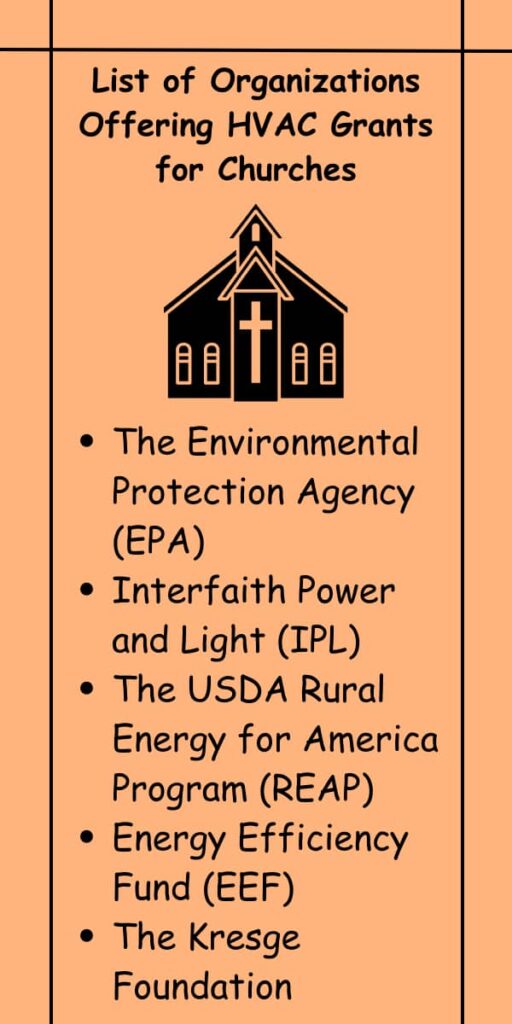
- The Environmental Protection Agency (EPA): The EPA offers various grant programs aimed at promoting environmental sustainability and energy efficiency, including grants for HVAC improvements in churches. These grants may support initiatives such as upgrading to energy-efficient HVAC systems, implementing renewable energy technologies, or conducting energy audits to identify efficiency opportunities. The EPA prioritizes projects that demonstrate a commitment to reducing greenhouse gas emissions, improving indoor air quality, and conserving natural resources.
- Interfaith Power and Light (IPL): Interfaith Power and Light is a non-profit organization dedicated to mobilizing religious communities to address climate change and environmental stewardship. IPL offers grants and resources to churches interested in implementing energy-saving measures, including HVAC upgrades. These grants may support the installation of energy-efficient HVAC equipment, energy management systems, or renewable energy technologies to reduce carbon emissions and lower utility costs.
- The USDA Rural Energy for America Program (REAP): The USDA REAP provides grants and loan guarantees to rural businesses, agricultural producers, and rural communities for renewable energy and energy efficiency projects, including HVAC improvements in churches located in rural areas. These grants may cover a portion of the costs associated with upgrading HVAC systems, installing energy-efficient equipment, or implementing energy conservation measures to enhance sustainability and reduce energy consumption.
- Energy Efficiency Fund (EEF): The Energy Efficiency Fund is a financial assistance program that offers grants and incentives to support energy efficiency projects in various sectors, including religious institutions such as churches. EEF grants may fund HVAC upgrades, retrofits, or replacements that improve energy performance and reduce operating costs. The program aims to promote the adoption of energy-saving technologies and practices to mitigate climate change and enhance energy security.
- The Kresge Foundation: The Kresge Foundation is a private philanthropic organization dedicated to advancing social and environmental justice through grantmaking and capacity-building initiatives. The foundation offers grants to support community development projects, including HVAC improvements in churches serving low-income communities or vulnerable populations. These grants may fund energy-efficient HVAC installations, building retrofits, or sustainability initiatives that benefit both the church and the surrounding community.
Conclusion:
In conclusion, churches seeking funding for HVAC improvements have access to various grant opportunities offered by organizations committed to environmental sustainability, energy efficiency, and community development.
The Environmental Protection Agency, Interfaith Power and Light, the USDA Rural Energy for America Program, the Energy Efficiency Fund, and the Kresge Foundation are among the organizations that offer HVAC grants for churches.
By leveraging these grant programs, churches can enhance their facilities, reduce energy costs, and contribute to a cleaner, more sustainable future for their communities.
[the_ad id=”39205″]
Frequently Asked Questions (FAQ):
Why Do Churches Need HVAC Grants?
Churches may face financial constraints when it comes to maintaining or upgrading their HVAC systems. HVAC grants provide financial assistance to help churches improve heating, ventilation, and air conditioning, ensuring a comfortable and safe environment for congregants.
What types of HVAC Grants Are Available for Churches?
Various types of HVAC grants are available, including equipment grants, installation grants, maintenance grants, energy efficiency grants, renewable energy grants, capacity building grants, accessibility grants, and emergency assistance grants. Each serves a specific purpose related to HVAC system improvement.
How Can Churches Find HVAC Grant Opportunities?
Churches can find HVAC grant opportunities by conducting thorough research. Explore online databases, community bulletin boards, government agency websites, and network within religious circles. Organizations like the EPA, Interfaith Power and Light, USDA REAP, Energy Efficiency Fund, and Kresge Foundation offer such grants.
What Are the Eligibility Criteria for HVAC Grants for Churches?
Eligibility criteria may vary, but common requirements include non-profit status, demonstrated need for HVAC upgrades, compliance with local building codes, and evidence of significant community impact. Churches should carefully review and meet the specific criteria of each grant opportunity.
What Documents Are Needed for The HVAC Grant Application Process?
Churches typically need documents such as proof of non-profit status, estimates or quotes from HVAC contractors, financial statements, building assessments, and mission statements or community impact reports. These documents help support the grant application and demonstrate the church’s eligibility and need.
How Can Churches Increase Their Chances of Securing HVAC Grants?
Churches can increase their chances by thoroughly researching grant opportunities, ensuring eligibility criteria are met, providing comprehensive documentation, and adhering to application guidelines. Following up on the application, maintaining open communication, and actively engaging in the process can also enhance success.
What Should Churches Do If Their HVAC Grant Application Is Not Successful?
If the application is not successful, churches should graciously accept the outcome and consider seeking feedback from the grant provider. Understanding areas for improvement can help refine future applications. Churches can also explore alternative funding opportunities.
How Long Does The HVAC Grant Application Process Typically Take?
The duration of the HVAC grant application process can vary. It depends on the specific grant program and the organization providing the funding. Churches should monitor the application status and stay informed about any updates or communications from the grant provider.
Leave a Reply